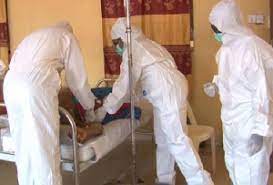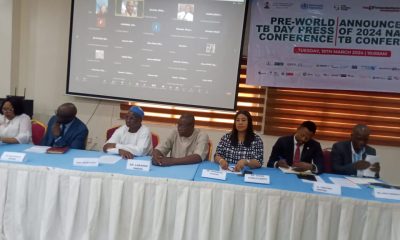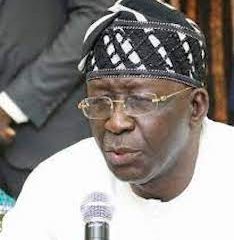Health
Nigeria Ranks High in TB Infection Despite Free Testing, FG Laments

By Laide Akinboade, Abuja
The Federal Government has expressed dismay with the country’s position in the recent World Health Organization’s Tuberculosis ranking.
“It is unfortunate that despite the availability of free testing and medication, Nigeria still ranked highest among countries in the world with TB especially among children,” Health Minister Osagie Ehanire, told a press conference organized on Friday, to commemorate the 2023 world TB day.
In the WHO’s global TB report, Nigeria ranks as the 6th country in the world and the first in Africa with the highest number of people infected with TB. It is also included among the 8 countries that have two-thirds of global TB cases.
According to Osagie who was represented by the State Minister of Health Ekumankama Joseph, Nigeria’s position on the ranking was a result of various negative factors:
“There are 467,000 TB cases in Nigeria in 2021. In 2022 there was an estimated 479,000 TB cases in Nigeria out of which 285, 562 were notified. In 2022, there is an estimated 3,932 Drug Resistance Tuberculosis cases were diagnosed and 3,185 (81%) were enrolled on second-line treatment,” he said.
The Minister further said the problems were compounded by the citizens’ ignorance of the TB virus. “Only one out of every four Nigerians has adequate knowledge about TB.”
However, the minister said the country recorded some improvement in the area of Human Immunodeficiency Virus (HIV) testing among TB patients as 97% of Nigeria’s TB patients have documented HIV results, which was far higher than the global and African region averages of 76% and 89% respectively.
“The federal government is committed to ensuring the end of TB in Nigeria. All the interventions of the Federal Government are yielding positive results. We have been able to expand the TB facilities from 2, 038 in 2014 to over 20, 000,” he said.
The Minister also called on Nigerians to take an active role in ending the transmission of Tuberculosis in the country. “If you or anyone you know is coughing for more than two weeks ensure that you get tested,” he advised.
Also Speaking, the WHO’s Country Representative (WR) Dr. Walter Mulombo, represented by Dr. Laxmikant Chavan WHO’s Technical Officer said that Nigeria at the United Nations High-Level Meeting (UNHLM) on TB in 2018 made a commitment to diagnose and treat 1,109,000 TB cases and place 2,183,890 clients on TB preventive Therapy (TPT) from 2018 to 2022.
“But after the end of 2022, Nigeria is yet to achieve this commitment as available reports show that the country is trailing behind in all the set targets,” he said.
He noted that TB control budgets in Nigeria continue to be drastically underfunded.
“About 69% of the TB budget in 2021 was unfunded, this is a major threat to the country’s efforts in achieving the set targets. Too many people are pushed into poverty when they contract TB due to lost income, transport costs, and other expenses. 71% of the TB patients in Nigeria and their households are affected by catastrophic cost due to TB.”
Dr. Walter reiterated WHO’s continued support to Nigeria in developing and implementing guidelines, plans, frameworks, and strategic documents to end the TB epidemic in Nigeria.
“In addition, we will facilitate research to provide evidence-based interventions and innovations for finding the missing TB cases and enhancing the country’s efforts in reaching the set targets. We will continue to work with the programme to build the capacity of senior and middle-level managers across the states on the needed knowledge and skills for improving quality of care and data analysis towards formulating evidence-based policies for enhancing programme performance at all levels. In addition, we will continue to support monitoring of the programme at all levels, in real-time, to identify challenges and advise on strategies to address the challenges,” he said.
Also, the Deputy Director, Office of HIV/ AIDS and TB USAID Nigeria, Omosalewa Oyelaran said since 2003, Nigeria remains in the top 10 countries affected by TB, with one of the lowest detection rates globally.
She said to combat this debilitating disease; USAID collaborates with the Government of Nigeria and other national and international partners to support the National Tuberculosis Program. Since 2003, USAID has contributed more than $250 million to TB control efforts in Nigeria.
In 2022 alone, USAID programs helped screen over 15 million individuals for TB. USAID’s support also includes the provision of TB screening, diagnostic, treatment, and preventive services in 18 states through community and facility-based interventions.
“In partnership with the Government of Nigeria, USAID’s ‘TB Accelerator’ model invested in local civil society organizations (CSOs) to increase access to quality TB prevention, diagnosis, and treatment, including multi-drug resistant TB.
“These local CSOs collaborate with the national and state TB programs to deploy, and scale, state-of-the-art equipment and tools to improve the detection of TB. USAID also facilitates multi-sectoral public-private partnerships to increase public awareness and advocate for domestic resources to address the TB epidemic in Nigeria. As a result, Nigeria realized a significant increase in TB case finding and treatment coverage over the past three years.
“Despite the additional challenges posed by the COVID-19 pandemic, we have achieved significant results working together in partnership with GON and Global Fund.
“We commend the Government of Nigeria’s efforts to sustain the accelerated service delivery that resulted in yearly case notification increases of 160 percent between 2019 and 2022.
“However, much remains to be done if Nigeria is to meet its TB control target of ending the TB epidemic by 2035. We must continue to work together to reach all TB patients and their contacts in Nigeria.
“However, the greatest challenge is the funding gap, which is estimated to be 70 percent of the resources needed to effectively control TB. Therefore, I call on you to mobilize domestic resources to meet this funding gap through budgetary allocations, the inclusion of TB services in health insurance schemes, and enhanced private sector engagement”, she said.
The Ag. Board Chair, Stop TB Partnership Nigeria, Dr. Queen Ogbuji in her goodwill message said out of the annual estimate of 479,000 TB cases in Nigeria, only 285,561 were notified.
According to her, it’s good progress in the right direction, considering the fact that Nigeria was able to increase its notification even when the world was grappling with COVID-19 and many countries of the world had low case notification and more TB deaths.
The increase has been consistent since then and Nigeria needs to be applauded for this. However, a lot needs to be done to close the gap. While we commemorate, let it remain top in our minds the picture that Nigeria ranks first in Africa and sixth in the world accounting for about 4.6% of the global TB burden
“TB disease is often more severe in children with higher mortality among those less than 5 years old. The notification of children with active TB disease has remained abysmally low at only 6% of the annual notification.
“As the country continues to make progress to find the missing TB cases and put them on treatment, many resources are needed to accomplish this, unfortunately, of the $373 million needed for TB control in Nigeria in 2020, only 31% was available and 24% of this came from the donors, only 7% was from domestic source”, she added.
Health
No pending Lassa Fever Cases in kaduna—–Official

Kaduna State Primary Health Development Agency, (KPHDA) says there is no pending cases of Lassa fever in the state.
Director of public health, Ibrahim Hamza-Ikara, told the News Agency of Nigeria on Wednesday in Kaduna, that the state has not recorded any Lassa fever cases for the past few weeks.
He added that all suspected cases have been discharged from the hospitals.
“We have not recorded any Lassa fever cases for the past few weeks and all the remaining eight patients have been discharged.
He said the state would continue it’s sensitisation programme on how best to improve hygiene practices to residents.
The News Agency of Nigeria recalls that on February 23, the state recorded four deaths of Lassa fever and three on admission from the 44 Nigerian Army Reference hospital in the state.
Others infected were identified and being closely monitored.
He urged residents to maintain proper food and environmental hygiene and immediately report any suspected cases of Lassa fever to the nearest health facility for prompt attention. (NAN)
Health
BNSG Signs MoU With Shanghai Haitian hospital, Sinoki System for Training Activities

From Attah Ede Makurdi
The Benue State Government, on Monday , singed Memorandums of understandings (MOUs) with the Shanghai Haitian Hospital, to facilitate academic and clinical interchange between Benue State University Teaching Hospital, Makurdi.
The partnership according to the MoU, is in the areas of joint studies, training activities, and other educational exchanges of mutual interest.
The government has also entered into partnership with Sinoki System Limited, for the establishment of a Hybrid Solar Panel Factory in Benue State.
Signing the two Memorandums of understandings (MOUs) at the Old Banquet Hall of the Benue State Government House, Makurdi on Monday, Governor Hyacinth Alia said he was excited and optimistic that the partnerships would open many more doors of investments in the State, adding that his administration is willing to welcome more investors into the state.
He described the partnership with the Shanghai Haitian Hospital as an exciting one, saying his administration is determined to improve the overall health sector in the state, thereby discouraging the trend of health tourism to other countries.
“I am quite excited because our administration’s focus is to improve the health sector in the state that will be capable of increasing the lifespan of our people. The Benue State University Teaching Hospital as a partner in this is going to benefit from this collaboration, and it is our hope to discourage our people going overseas on medical tourism. There is nothing wrong in translating the finances spent elsewhere into our system.
“The partnership with the Shanghai Haitian Hospital will open more doors, especially as we also have Tertiary healthcare systems here in the state. Where we inherited total collapse of the healthcare system, we need to put all machinery in place to ensure that beginning from the primary to our tertiary health institutions, there are improvements.”
On the partnership with Sinoki System Company for the establishment of a Hybrid Solar Panel Factory in Benue State, the governor described it as a quick fix to the epileptic power challenge faced in the state, explaining that for every business to thrive, there must be some stability in electricity and he is excited about the partnership.
“The partnership is going to be a plus to the State. The business partnership will bring about the establishment of Hybrid Solar Panel Company in Benue State, through a Private Partnership agreement between the Benue State Government and Sinoki System Limited. We are excited about this because it will open more investment doors in the state.
“As I have mentioned at some other forums, we are a state that is open for business, and we are welcoming investors into our state to come and do business.
“The establishment of the Hybrid solar panel company in the state has come at a time when the electricity situation has been epileptic. But for business to thrive, we definitely need some stability of electricity. This is one quick fix to the anxiety and I am very excited about it,” the governor explained.
He called for more investors to take advantage of the many untapped investment opportunities in the state, promising that government on its part will continue to create the enabling environment for businesses to thrive in the state.
Earlier in his address, the Special Adviser to the Governor on International Investment, Hon. Alex Adingi, while introducing the investors, said the investors have expressed their desire to partner with the state government in the two areas of health and energy for the overall good of the state, been the reason they have come to sign the partnership agreement.
A statement by chief press secretary to Governor Alia, sir Tersoo Kula said William Wang, a Director with the Shanghai Haitian Hospital, represented the Hospital while Liu Hai Ding, represented Sinoki System Limited.
Health
Lassa Fever: NCDC Registers 1 Death, 15 New Cases in 1 Week

The Nigeria Centre for Disease Control and Prevention (NCDC) has reported one death and confirmed 15 new cases of lassa fever within one week across the country.
The NCDC said this in a situation report for week 13 published on its website on Friday.
Reports says that lassa fever is an acute viral hemorrhagic illness transmitted to humans through contact with food or household items contaminated by infected rodents or contaminated persons.
Its symptoms include fever, headache, sore throat, general body weakness, cough, nausea, vomiting, diarrhoea, muscle pains, chest pain, and, in severe cases, unexplainable bleeding from ears, eyes, nose, mouth and other body openings.
The NCDC noted a decrease in the number of confirmed cases from 25 cases in week 12 to 15 cases in the reporting week, although the number of suspected cases increased compared to the same period in 2023.
Cumulatively, from week one to 13, the country recorded 806 confirmed cases and 150 deaths, with a case fatality rate (CFR) of 18.6 per cent, higher than the CFR for the same period in 2023 (17.5 per cent).
“Twenty-five states have recorded at least one confirmed case across 125 local government areas in 2024.
“Sixty-two per cent of all confirmed cases were recorded from Ondo, Edo, and Bauchi, with Ondo State accounting for 24 per cent, Edo 22 per cent, and Bauchi 16 per cent,” it said.
According to the report, no health worker was infected in the reporting week, and individuals between the ages of 31 and 40 were predominantly affected by the infection.
The NCDC said the National Lassa Fever Multi-partner, Multi-sectoral Incident Management System had been activated to coordinate response at all levels at the Emergency Operations Centre (EOC).
The NCDC highlighted some challenges in the fight against lassa fever, including the late presentation of cases leading to increased CFR and poor health-seeking behaviour.
It attributed the latter to the high cost of treatment and clinical management of lassa fever, as well as poor environmental sanitation and awareness in high-burden communities. (NAN)































